Eyes on a Miracle
In West Africa, Duke eye surgeon Lloyd Williams is helping local doctors restore sight to the blind, a mission that is both easier and harder than you’d think.
BALU SESAY had been blind for 29 years when Lloyd Williams, MD, PhD first met her. It was a sweltering day in July 2021, in a small hospital exam room in Freetown, the bustling port capital of Sierra Leone. The Duke eye surgeon saw immediately that both of Sesay’s eyes were badly damaged, the right one completely ruined and a milky haze covering the left, both the result of injuries she sustained as a teenager. Now 46 and the mother of five, Sesay had never seen her husband or her children.
What brought her to Freetown, nearly three hours from her home, was a promise she still couldn’t quite believe: that her left eye could be fixed, that her years in the dark might end.
The next day, Williams worked with a team of Sierra Leonean ophthalmologists to replace the opaque cornea in her left eye with one from a donor. It was one of eight corneal transplants that week, the first ever performed in the West African country. Twenty-four hours later, when doctors removed the patch protecting her repaired eye, she walked into the waiting room and toward a teenage child whose eyes were flooding with tears. “Girl, why are you crying?” she asked in Krio, the local language.
“Mom, it’s me,” the girl cried, reaching out to embrace her mother. “I am your daughter.”
Even for Williams, who has performed hundreds of vision-restoring surgeries in the United States and other countries, those moments are soul-stirring. It’s why he’s back in Freetown nine months later, having traveled 7,000 miles, taking three planes and a boat, clutching a Styrofoam cooler packed with human eyeballs.
“It’s the closest we can come to performing miracles on Earth,” he says.
This story originally appeared in the Fall 2022 issue of Duke Magazine
Read the Full Story of Williams Journey to Save Sight in Sierra Leone
Restoring Sight in Sierra Leone

In April 2022, Duke eye surgeon Lloyd Williams, MD, PhD, traveled to Sierra Leone to perform corneal transplant surgeries, restoring sight for patients who had suffered corneal-related blindness for years. Williams, associate professor of ophthalmology and director of the Duke Global Ophthalmology Program, performed 19 corneal transplants and four non-transplant surgical procedures during the visit.
The trip followed one Williams made in July 2021, when he performed the first corneal transplants ever done in Sierra Leone. The most recent visit brought another milestone — the first corneal transplant performed by a Sierra Leonean physician: Jalika Mustapha, MD, who leads the National Eye Programme in the West African nation and trained with Williams on the surgical technique. The trip was coordinated by Williams as part of the renewed Duke Global Ophthalmology Program. Williams and other Duke ophthalmologists have made dozens of trips to countries in Africa, Asia, and Central America. The renewed focus will enable a coordinated effort to further increase research, education, and patient care across the globe. Countries such as Sierra Leone often have few trained eye specialists and lack the infrastructure for comprehensive eye care, contributing to a global burden of preventable vision loss and blindness. According to estimates by the World Health Organization, nearly half of the world’s 2.2 billion people who suffer vision impairment or blindness could be helped by treatment or surgery.
“We believe that this work will generate important research findings regarding the genetics and treatment of major blinding conditions in Africa,” said Williams. “We also believe this work will help elevate the status of international medical leaders to enable the expansion and improvement of eye care abroad.” — Michael Penn
This story originally appeared in the Spring 2022 issue of Duke Med Alumni News
Williams featured on CataractCoach Podcast
Lloyd Williams, MD, PhD shares stories of bringing vision miracles to patients in need around the world.










